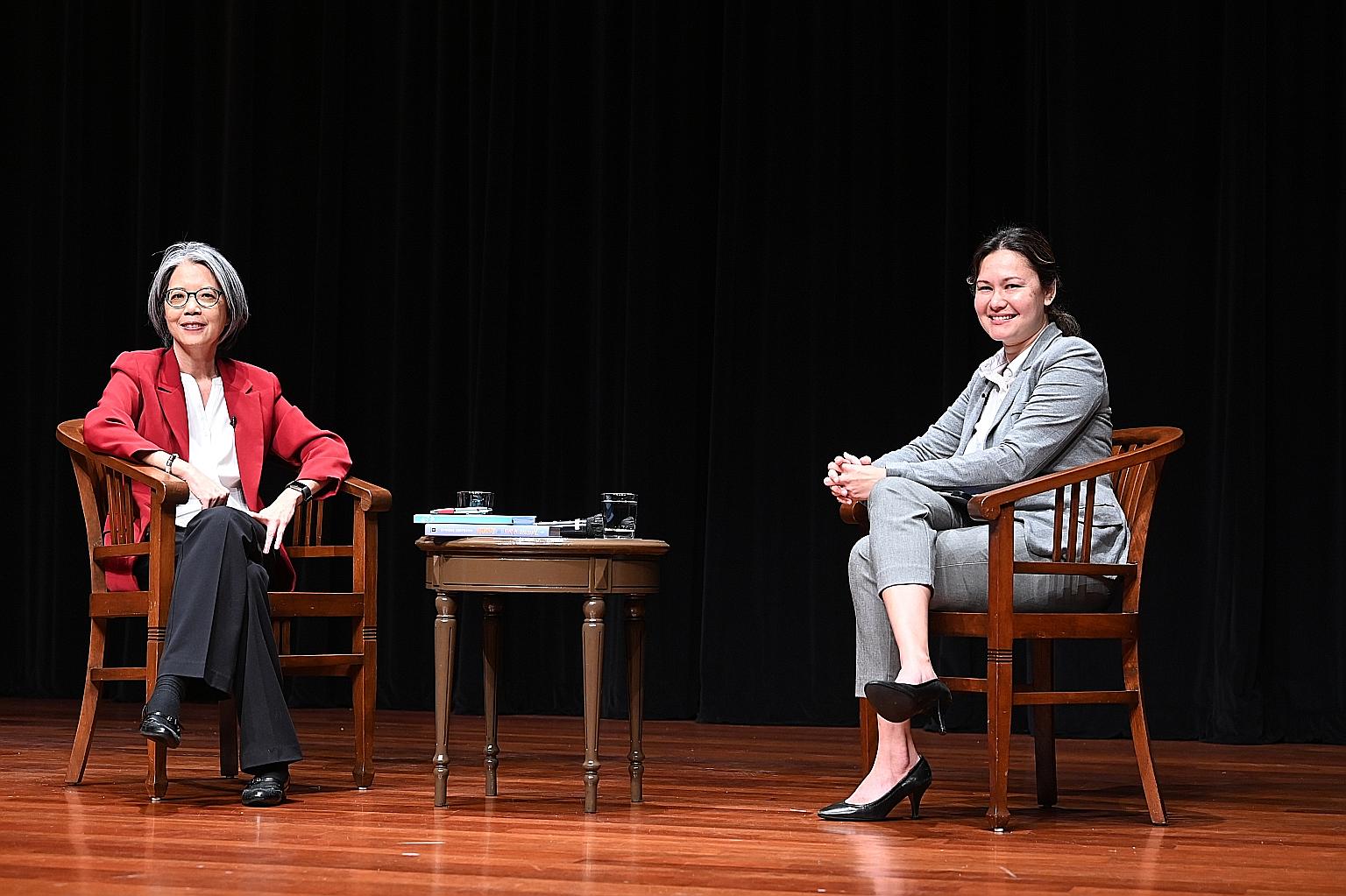Call to review NS to weed out toxic masculinity
Practices that skew view of what it means to be a man should be relooked: Aware head
Sign up now: Get ST's newsletters delivered to your inbox

Executive director of Aware Corinna Lim (left) with moderator Eunice Olsen during a question-and-answer session yesterday at the third lecture of this year's Institute of Policy Studies-Nathan Lecture Series. In her lecture, Ms Lim focused on preconceived ideas of what it means to be masculine and how some ideas prevalent among young people affect gender equality here.
PHOTO: INSTITUTE OF POLICY STUDIES
It is time to review national service (NS) to weed out unhealthy practices that give men a skewed view of what it means to be masculine, said veteran women's rights activist Corinna Lim.
There is also a need to zero in on bullying in schools and the prevalence of pornography among boys to put an end to some toxic practices that skew their understanding of what it means to be a man and foster healthy ideas of being male, she said in a lecture yesterday.
Conscripting women for national service, addressing the culture of what she called hypermasculinity in basic military training and moving away from abstinence-only sex education in schools are also key steps in the march towards better gender equality, said Ms Lim.
She said: "The men that I spoke to described NS as a hyper-masculine experience. NS is designed to toughen up our boys and to build bonds between males across ethnic and class divides. However, there are aspects of national service that bring out the more negative norms of masculinity.
"Ultimately, we should make NS totally gender-neutral so that everyone, regardless of gender, can opt for two years of military, police, civil defence, community or healthcare, and whatever other total defence areas that need people. The equal participation of women in NS will automatically make national service less masculine."
That also means rooting out a homophobic and misogynistic culture that leads to a toxic environment during national service, Ms Lim said.
She recounted the story of a man she called Tim who, unlike other men, was relieved to be spared blanket parties in the army where the victim is covered with a blanket and beaten up. The victim, she added, is usually a soldier seen as the weakest link or who is disliked.
Ms Lim, executive director of the Association of Women for Action and Research (Aware), was delivering the third lecture of this year's Institute of Policy Studies-Nathan Lecture Series. The series is named in honour of Mr S R Nathan, Singapore's sixth president.
Ms Lim focused on preconceived ideas of what it means to be masculine and how some ideas prevalent among young people affect gender equality in Singapore. She cited studies on the issue and also used anecdotal evidence gleaned from her interviews with men.
Another issue that feeds into toxic ideas of masculinity, Ms Lim said, is school bullying. She added that there is a need to revamp sex education in Singapore.
A study by the Organisation for Economic Cooperation and Development, she said, found that 15-year-old students in Singapore experience more bullying than their peers in 50 other countries or territories. Only children in Latvia and New Zealand have it worse.
Boys who were pressured to conform to masculine norms were four times more likely to commit violence against others, she added.
Although a 2017 study by the Institute of Mental Health found that more women than men suffer from depression in Singapore, the rate of suicide for men is double that of women, not only here but also in most other countries, Ms Lim said.
She also touched on the need for comprehensive sexual education in schools with a focus on consent, respect and healthy relationships, as well as the establishment of men's support centres that offer coaching and support groups.
Ms Lim said she was hopeful and excited about the future of gender equality in Singapore.
Referring to the government review to tackle issues affecting women in Singapore that kicked off last October, she said: "I hope that one day, we will celebrate the gender equality review as a historic event - that moment of pivot when Singapore started to embrace gender equality and never looked back."
Ms Lim also fielded questions during a question-and-answer session moderated by former nominated MP Eunice Olsen.


